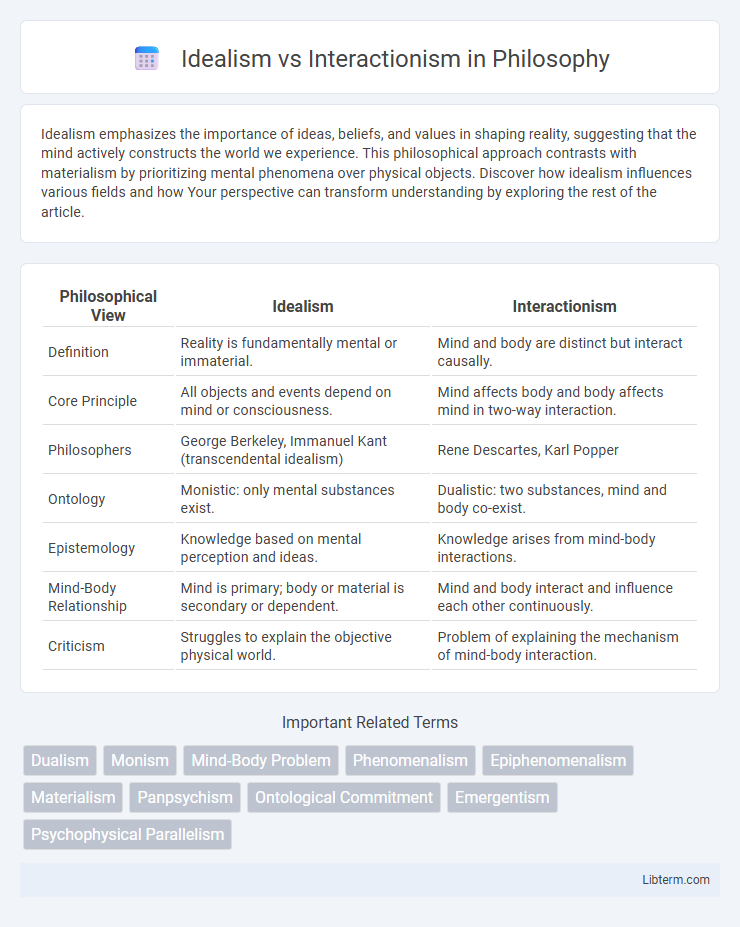Idealism emphasizes the importance of ideas, beliefs, and values in shaping reality, suggesting that the mind actively constructs the world we experience. This philosophical approach contrasts with materialism by prioritizing mental phenomena over physical objects. Discover how idealism influences various fields and how Your perspective can transform understanding by exploring the rest of the article.
Table of Comparison
| Philosophical View | Idealism | Interactionism |
|---|---|---|
| Definition | Reality is fundamentally mental or immaterial. | Mind and body are distinct but interact causally. |
| Core Principle | All objects and events depend on mind or consciousness. | Mind affects body and body affects mind in two-way interaction. |
| Philosophers | George Berkeley, Immanuel Kant (transcendental idealism) | Rene Descartes, Karl Popper |
| Ontology | Monistic: only mental substances exist. | Dualistic: two substances, mind and body co-exist. |
| Epistemology | Knowledge based on mental perception and ideas. | Knowledge arises from mind-body interactions. |
| Mind-Body Relationship | Mind is primary; body or material is secondary or dependent. | Mind and body interact and influence each other continuously. |
| Criticism | Struggles to explain the objective physical world. | Problem of explaining the mechanism of mind-body interaction. |
Understanding Idealism: Core Principles
Idealism centers on the belief that reality is fundamentally mental, with consciousness shaping the nature of existence. This philosophy asserts that ideas, perceptions, and minds are the primary substances, reducing physical objects to manifestations of the mind. Prominent thinkers like George Berkeley emphasize that material reality depends on being perceived, highlighting the intrinsic connection between mind and world in idealist thought.
Defining Interactionism in Philosophy
Interactionism in philosophy defines the theory that mind and body are distinct entities that causally influence each other, challenging strict materialism and dualism. It posits that mental states, such as beliefs and desires, can directly affect physical processes in the brain and vice versa, establishing a bidirectional relationship. This perspective contrasts with idealism, which holds that reality is fundamentally mental and denies the independence of the physical world from the mind.
Historical Roots of Idealism
Idealism traces its historical roots to ancient philosophers such as Plato, who emphasized the primacy of ideas and forms over material reality. This philosophical tradition evolved through the works of German idealists like Immanuel Kant and Georg Wilhelm Friedrich Hegel, who argued that reality is fundamentally shaped by the mind and consciousness. Idealism contrasts sharply with interactionism, which posits a dualistic relationship between mind and body, highlighting the historical significance of idealism in shaping metaphysical debates about the nature of reality and consciousness.
Origins and Development of Interactionism
Interactionism originated in the early 20th century as a response to both idealism, which emphasizes the primacy of mind, and physicalism, focusing on the body. Philosophers like Rene Descartes initially proposed a dualistic interaction where the mind and body influence each other, sparking ongoing debates on causal relationships. The development of interactionism incorporated advances from psychology and neuroscience, highlighting complex feedback loops between mental states and brain processes.
Key Thinkers: Idealism vs Interactionism
Idealism, rooted in the philosophies of George Berkeley, emphasizes the primacy of mind and ideas, asserting that reality is fundamentally mental. Interactionism, prominently advanced by Rene Descartes, posits a dualistic model where mind and body are distinct but causally interact. Both frameworks address the mind-body problem but diverge on whether reality is purely mental or involves dynamic mind-body exchanges.
Mind and Reality: Comparing Perspectives
Idealism posits that reality is fundamentally mental, with the mind shaping or even constituting the external world, emphasizing subjective experience as the primary basis of existence. Interactionism argues for a dualistic relationship where the mind and physical world are distinct yet causally connected entities, allowing mental states to influence physical processes and vice versa. These contrasting perspectives highlight the debate on whether reality is purely mental or involves dynamic interactions between immaterial consciousness and material substance.
Strengths of Idealist Thought
Idealist thought offers a profound strength in emphasizing the primacy of consciousness, highlighting how subjective experiences shape reality and human understanding. Its focus on mental constructs fosters deeper insights into the nature of knowledge, morality, and existence, promoting a holistic view that integrates mind and world. This perspective challenges materialist assumptions, enriching philosophical discourse by prioritizing ideas and perception as the foundation of reality.
Critiques of Interactionist Approaches
Interactionist approaches, which posit a dynamic relationship between mind and body, face critiques centered on the problem of causal interaction, as it remains unclear how non-physical mental states can influence physical brain processes. Critics highlight the lack of empirical evidence for a coherent mechanism bridging the mental and physical realms, challenging the scientific validity of interactionism. Furthermore, interactionism struggles with the conservation of energy principle in physics, as mental causation appears to violate this fundamental law.
Idealism vs Interactionism in Modern Contexts
Idealism posits that reality is fundamentally mental or immaterial, emphasizing consciousness as the primary substance, whereas Interactionism asserts a dualistic framework where mind and body interact causally. In modern contexts, Idealism influences fields like virtual reality and cognitive science by highlighting the primacy of perception and mental constructs in shaping experiences. Interactionism remains relevant in neuroscience and psychology, where researchers explore the bidirectional effects between neural processes and subjective experiences.
Future Directions in Philosophical Debate
Future directions in the philosophical debate between Idealism and Interactionism emphasize integrating advances in cognitive science and quantum mechanics to better understand consciousness and mind-matter relations. Researchers explore hybrid models combining Idealism's emphasis on mental phenomena with Interactionism's framework of mutual influence between mind and body. Emphasis on empirical validation and interdisciplinary collaboration aims to resolve longstanding metaphysical questions about the nature of reality and the mind's causal efficacy.
Idealism Infographic

 libterm.com
libterm.com